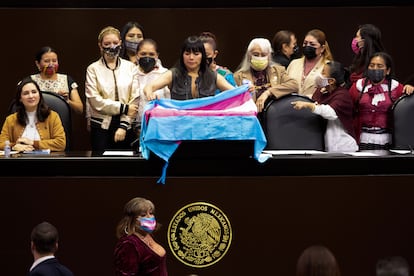Salma Luévano, the first transgender member of Congress in Mexico: ‘I receive death threats on a daily basis’
As the ‘mother of the rainbow quotas,’ the politician talks about the challenges she has faced since she took up her seat in the Chamber of Deputies

Why are you dressed up as a woman if you’re a man? Have you found your prostate yet? You’re a degenerate. You’re deranged. You need to be shut up. Parasite. Pervert. Go see a psychologist and get your head fixed. Circus clown. Because of scum like you, Mexico has become a laughing stock. Nobody loves you. Narco. Pedophile.
These are just some of the insults Salma Luévano, Mexico’s first trans MP, received on Twitter in early July. There are hundreds more in the same vein. Most were in response to a tweet of a photo of herself and the words: “In life, there are many opportunities and one of them is finding and loving yourself.”
Luévano, 55, is a very tall, modern woman. Wearing a black suit, she talks to EL PAÍS in the lobby of the Chamber of Deputies; behind her are the faces of some of Mexico’s presidents. She feels comfortable with the lights and the camera, adjusts her hair, and gives instructions to her team to organize the next Diversity Commission meeting, which she chairs.

“On my social media, whatever I post, I receive daily death threats,” she says. “I am singled out because of my identity. I receive an endless stream of horrendous hateful epithets that are not only directed against me, but also against our collective. This hate speech is the prelude to hate crimes and unfortunately, these are on the rise.”
Mexico has the most crimes against trans people in the Americas, after Brazil: 649 between 2008 and 2022, as documented by the Observatory of Murdered Trans People. Last year alone, the platform registered 56 murders.
Luévano entered the Mexican Congress as an MP in September 2021, as a member of the ruling center left Morena party. Together with her partner María Clemente, she is the first transgender person reach these echelons of power, marking a watershed in a region where the life expectancy for trans women barely exceeds 35, compared to 77 for the population in general. “We have made history and it is a great precedent, not only in Mexico, but internationally,” she says. “And the truth is, it is also a massive commitment.” The journey so far has been, and continues to be, an endurance test.
Sex work, oil and hairdressing
The youngest of 13 siblings, Luévano grew up in Minatitlán, a city in southern Veracruz on the coast. She says she was a shy child, who cried a lot. “I was subjected to violence and discrimination for as long as I can remember,” she says. “I didn’t understand why I was different, nor why there was so much hatred. All that persecution of such a small person. Why the beatings?” She says that she took refuge in a “castle” she created under her bed and in her mother’s embrace.

Her mother, Alicia Luna, was a rancher, says Salma, but also “an example of resistance and resilience.” And she helped Salma discover her own “light.” She says it is thanks to her that she has been able to move forward, and is now a “confident and strong” woman. It was her mother, she says, who provided her with the foundations on which to rebuild herself every time she got knocked down. Luévano transitioned in adolescence, after high school, and embarked on some questionable paths.
“Sex work is very dangerous,” she says. “When you go out, you don’t know when you’ll come back.” Luévano speaks of the women who are beaten, imprisoned, and murdered; of the lack of guarantees, of going through life without decent housing, and without access to a hospital. According to a report by the National Commission for the Prevention of Discrimination (Conapred), more than 60% of the transgender population in Mexico experiences labor discrimination and only 5% work in a professional sphere.
Luévano also talks about the vegetable and car oil that many trans women injected themselves with as they were the cheapest aesthetic operations. “Back then, trans women were under pressure to have voluptuous bodies, otherwise we didn’t fit the stereotype. Unfortunately, because most of us did not have social security, we resorted to charlatans and filled our bodies with oil. Many died doing that, and those of us around today who put oil in our bodies are the survivors who are living and suffering the after-effects.”
Because she didn’t want to spend her life as a sex worker, Luévano saved up and opened her first beauty salon. “I was doing well and was able to leave sex work behind me,” she says. It is when she talks about the haircuts she practiced from adolescence with her siblings as guinea pigs that Salma Luévano lights up. “I used to give them brutal cuts,” she says. “I learned empirically, I watched and imitated. I don’t even know how I did it, but it was very cool and people would seek me out and I would go to their houses to cut their hair and earn a few pesos.” Salma still thinks of herself as a hairdresser. In fact, it was while she was still working in her beauty salon in Aguascalientes that the seeds of her political career were sown.
Rainbow quotas
After decades of activism, Salma Luévano says that she felt tired and frustrated: “Why aren’t we in the decision-making spaces?” she wanted to know. “Years went by being part of the resistance, of fighting in the streets and there came a moment when I could see that we were not making any progress in having our rights recognized.” While talking to lawyer friends, the idea emerged of resorting to so-called positive discrimination, what Luévano has baptized “rainbow quotas,” or spaces in institutions reserved for “groups in vulnerable situations,” with a particular focus on the LGTB+ collective.

It began with an official complaint about the lack of such quotas to the local election authority of Aguascalientes and ended at the Federal Electoral Tribunal with Salma Luévano and her team obtaining 10% of spots for vulnerable minorities. “It was going to stay at the local level,” she says. “But it ended up at the federal level, with those quotas that I represent now.” She considers herself the “mother” of these quotas, which she defends tooth and nail: “They are neither whims nor privileges for the collectives,” she says. “These quotas still do not put them on an equal footing with the privileged groups, with that power dome.”
Luévano says that in the Chamber of Deputies there are two female MPs out of 500, so it is not easy to “push the agenda forward.” She points out that there is no magic wand to wave and that she cannot do it alone: “I need civil society behind me,” she says. In the almost two years as an MP, Luévano has presented 24 initiatives related to LGTB+ rights, such as having a particular day against hate speech and introducing measures against the so-called conversion therapies. She also stresses the importance of representation: “The fact that a trans woman reaches these decision-making spaces normalizes what is normal. By educating, it raises awareness, and if it raises awareness, it creates empathy and by creating empathy it helps to lower all hate crime statistics. That is why we cannot allow this door that has been opened to close again.”
But she recognizes that the more visible the agenda, the stronger the attacks. In Congress, Luévano has been called “Sir” by the MP Gabriel Quadri, after he stated that “trans women are men who pretend to be women.” She took the issue to the Electoral Tribunal of the Judiciary of the Federation, and won. The tribunal made Quadri take a course on political violence against women based on gender and another on violence against members of the LGTB+ collective. “It doesn’t matter how strong the attacks are, because I have always lived in a state of resistance on account of my identity,” she says.
This story is part of LIDERESAS DE LATINOAMÉRICA, a series on Latin American female leaders, in partnership with Luminate.
Sign up for our weekly newsletter to get more English-language news coverage from EL PAÍS USA Edition
